Research and practice for health and human rights in the occupied Palestinian territory, October 2020
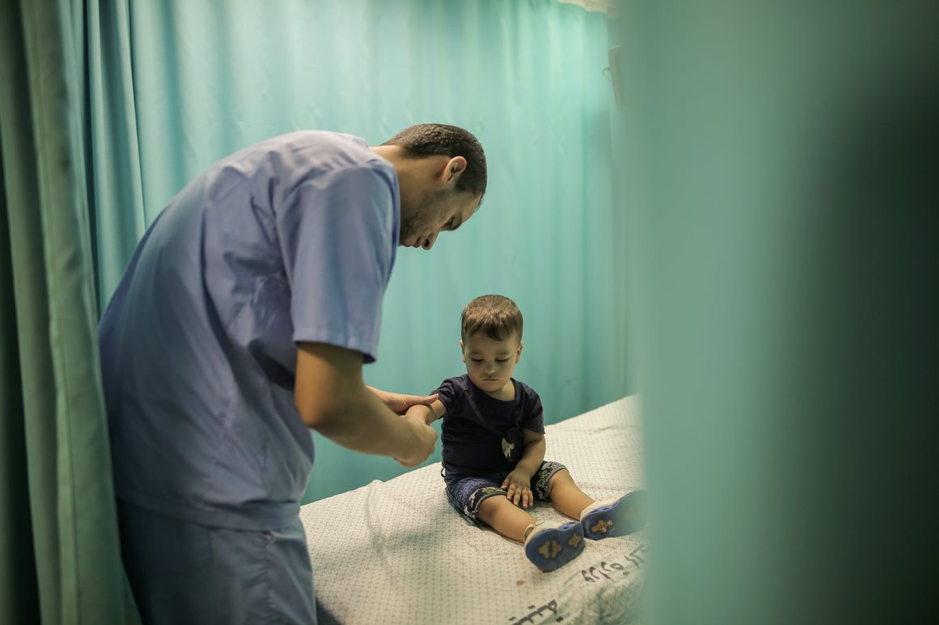 20 October 2020, Birzeit & Jerusalem – Twenty-five participants from civil society organizations working on health and human rights, in addition to undergraduate and postgraduate students, today completed a 5-day course on Research and Practice in Health and Human Rights.
20 October 2020, Birzeit & Jerusalem – Twenty-five participants from civil society organizations working on health and human rights, in addition to undergraduate and postgraduate students, today completed a 5-day course on Research and Practice in Health and Human Rights.
The course was organized by the Institute of Community and Public Health at Birzeit University, Lancet Palestinian Health Alliance, UNFPA Palestine, and WHO in the occupied Palestinian territory, and examined the application and intersection of health and human rights in theory and practice. The course was strongly interactive, with practical sessions to build understandings and initiatives between sectors to strengthen activities to promote the right to health and a human rights-based approach to health in the occupied Palestinian territory.
In her closing remarks, Professor Rita Giacaman from the Institute of Community and Public Health at Birzeit University and the Lancet Palestinian Health Alliance surmised, “This has been a great experience, telling us that despite this pandemic, we are still able to continue with our lives, learn new things, and cope with the situation. I’d say typically Palestinian, as many of us have been through curfews and exposure to violence previously. But as a people we have a special capacity to endure and resist.”
Mr Ziad Yaish, Deputy Representative for UNFPA Palestine, emphasized “For women and girls, the right to health, and in particular the right to sexual and reproductive health, is a key aspect of being able to live a healthy and fulfilled life. This was confirmed at the International Conference on Population and Development (ICPD) in 1994, and it was reconfirmed again during last year’s Nairobi Summit, which marked 25 years of the ICPD. A hundred and seventy countries including the State of Palestine participated in this summit and made bold commitments to transform the world by ending all maternal deaths, unmet needs for family planning, and gender based violence and harmful practices against women and girls by 2030”.
Finally, Dr Gerald Rockenschaub, Head of WHO office in the occupied Palestinian territory, concluded, “The right to health and barriers to accessing health services in the Palestinian context are a collective concern that require our consolidated efforts. At WHO, the right to health is enshrined in our constitution, which states that health is a fundamental and universal human right. We must maintain principled advocacy and strengthen this through shared knowledge, experiences and practices, to build our collective capacity to address challenges to realizing the right to health for all Palestinians.”
The course was supported by funds from the Swiss Development Cooperation to WHO and core funding from UNFPA.
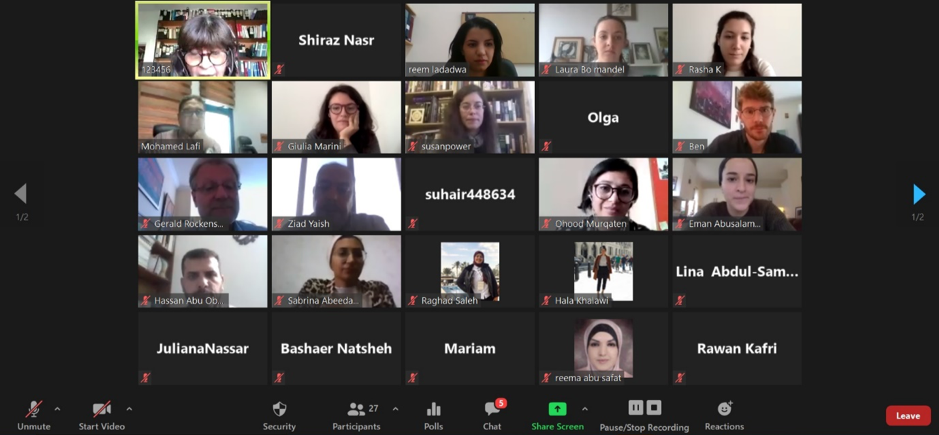
Further information:
Dr. Ben Bouquet
Technical Officer (Public Health and Human Rights)
WHO oPt
Saja delayed access to the treatment she needs, September 2020
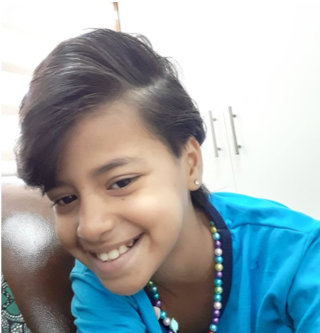
14 September 2020 - Saja is a 9-year-old girl who was diagnosed with acute myeloid leukaemia in May 2019.
She needs a bone marrow transplant, not available in the Gaza Strip, and has not been able to access the treatment she needs since March 2020.
Saja’s mother is from Morocco, and she was diagnosed with acute myeloid leukaemia during a family visit to Rabat, Morocco, in May 2019. Saja received her initial chemotherapy in Rabat, before returning home to Gaza in February 2020 to continue her treatment and undergo bone marrow transplantation in the occupied Palestinian territory.
An initial appointment was scheduled for 22 March 2020 at An-Najah Hospital in Nablus, in the West Bank, but the hospital only offers autologous transplantation (using the patient’s own bone marrow), while Saja needed an allogeneic transplant (with bone marrow from a donor). Saja was rescheduled an appointment at Augusta Victoria Hospital in East Jerusalem, but again the hospital could only offer autologous transplantation. Eventually, on 15 July 2020, Saja received an appointment to attend the King Hussein Cancer Centre in Jordan, however she was unable to exit to Jordan because of the border closure due to the COVID-19 pandemic.
After a delay of around six weeks, Saja was scheduled for an appointment at Tel Hashomer, an Israeli hospital east of Jaffa, for 6 September. However, Israeli authorities advised the family to change her companion since her mother doesn’t have a Palestinian ID. The family appealed the decision in the Israeli civil courts through Physicians for Human Rights Israel, after rearranging her hospital appointment to 15 September. On 14 September, Saja’s appeal was upheld; she was finally able to travel for treatment the next day.
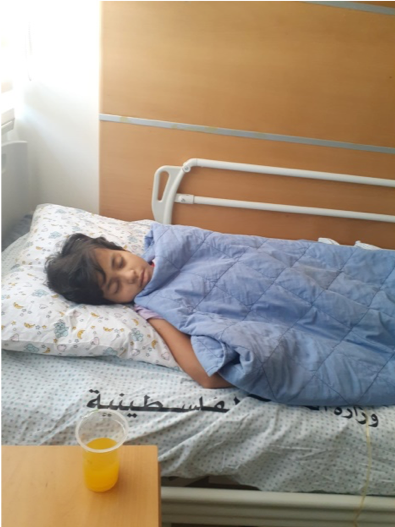
Throughout efforts to refer Saja for bone marrow transplant, she has been receiving chemotherapy at Rantisi Hospital in Gaza City. Her mother, Najlaa, commented, “We are from Rafah, and the journey from Rafah to Gaza takes about an hour. At times we’ve had to attend Rantisi Hospital every other day. It’s exhausting and putting a strain on us physically and financially.”
Saja’s health has been deteriorating in recent months, as she suffered the effects of leukaemia. Admitted to Rantisi Hospital before hearing the result of her appeal, she had needed platelets but faced severe delays with the outbreak of COVID-19 in the Gaza Strip. Even relatives who had been willing to travel to donate platelets for her had not been able to reach the hospital due to the movement restrictions in place.
During the COVID-19 outbreak, just as outside it, no patient should be delayed or prevented from accessing the healthcare they need.
WHO pays tribute to Real Life Heroes on World Humanitarian Day: Abed
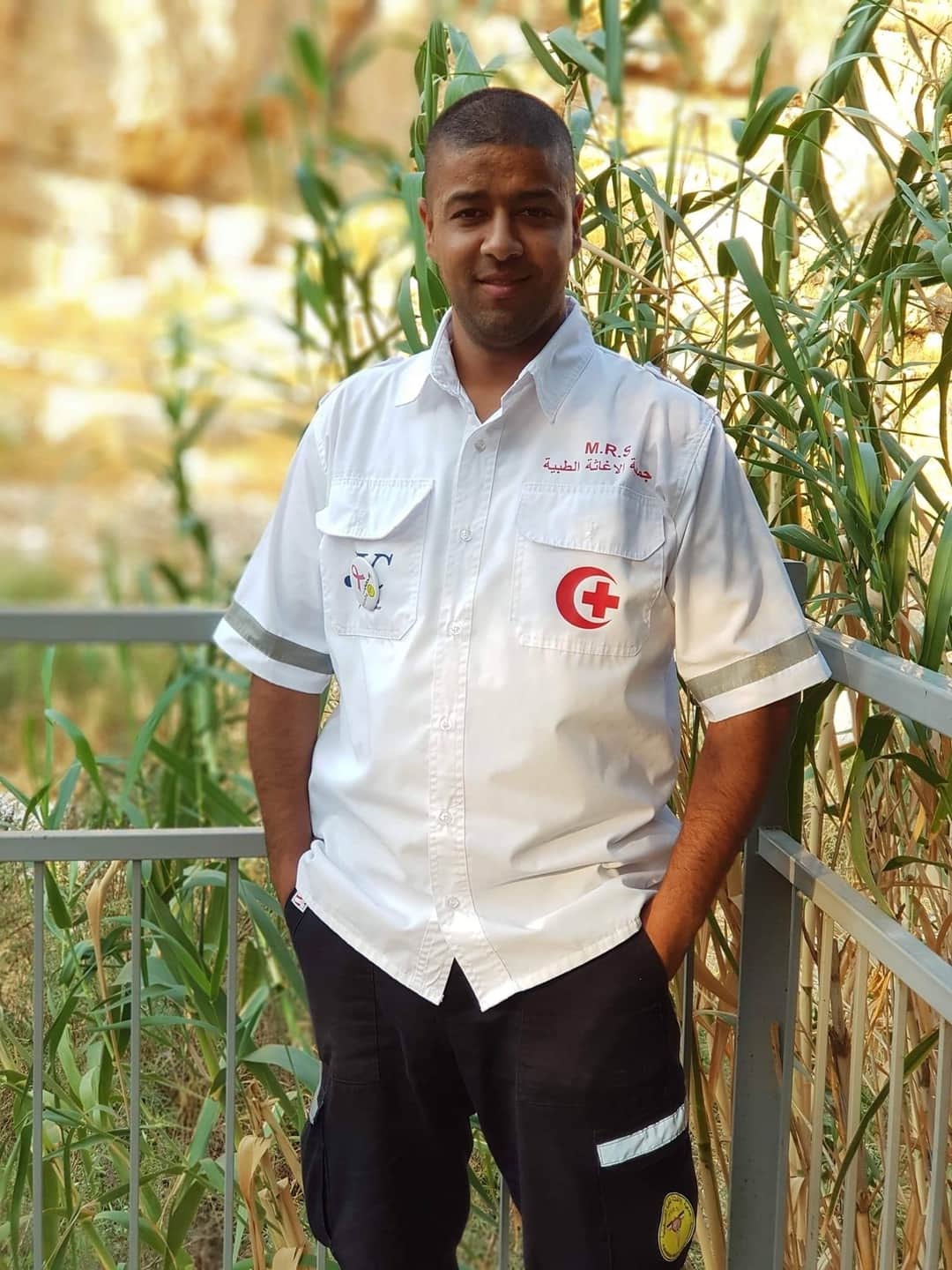 Abed Almuhdi Ghareeb is a 25-year-old paramedic and coordinator of the Palestinian Medical Relief Society (PMRS) ambulance teams and volunteers in Bethlehem governorate. He also works as youth project coordinator in the southern districts and suburbs of Jerusalem.
Abed Almuhdi Ghareeb is a 25-year-old paramedic and coordinator of the Palestinian Medical Relief Society (PMRS) ambulance teams and volunteers in Bethlehem governorate. He also works as youth project coordinator in the southern districts and suburbs of Jerusalem.
Abed Almuhdi lives in Dheisheh refugee camp and began volunteering with PMRS when he was just 13 years old. His journey started when PMRS teams came to his school and introduced the students to their work. Abed joined courses in first aid and field paramedic skills, but he hadn’t thought he would end up working with ambulance teams himself.
“Once I had done the courses, I found I liked the work a lot and I was first in my class. I decided to volunteer and join the paramedic team.”
Abed Almuhdi tried work in other fields, but even during those times he continued to volunteer for PMRS.
“My work is a part of who I am… When you help someone who is injured you feel that you did something good, something to be proud of. You do not feel that in other jobs.”
In February 2020, PMRS started preparing a response plan in light of the COVID-19 public health emergency. Abed participated in several preparation sessions on how to deal with COVID-19.
On 7th March when the first cases of COVID-19 were announced in Palestine, Abed worked to train volunteers and raise public awareness on hygiene and prevention measures. The paramedic teams initially focused on providing social support to households in quarantine.
“When we started our work in the field, we did not have any protective clothes, then the Engineers Syndicate donated 4 protective suits. We used the same suit for around 2 months, disinfecting it each time. The first days were stressful and scary, as we did not have a full understanding of what we were dealing with. In our country we are used to dealing with injuries due to clashes, but this pandemic was something new. There was nothing and then suddenly everything closed in the country and we had to be out there doing our best to fight something we did not fully understand.”
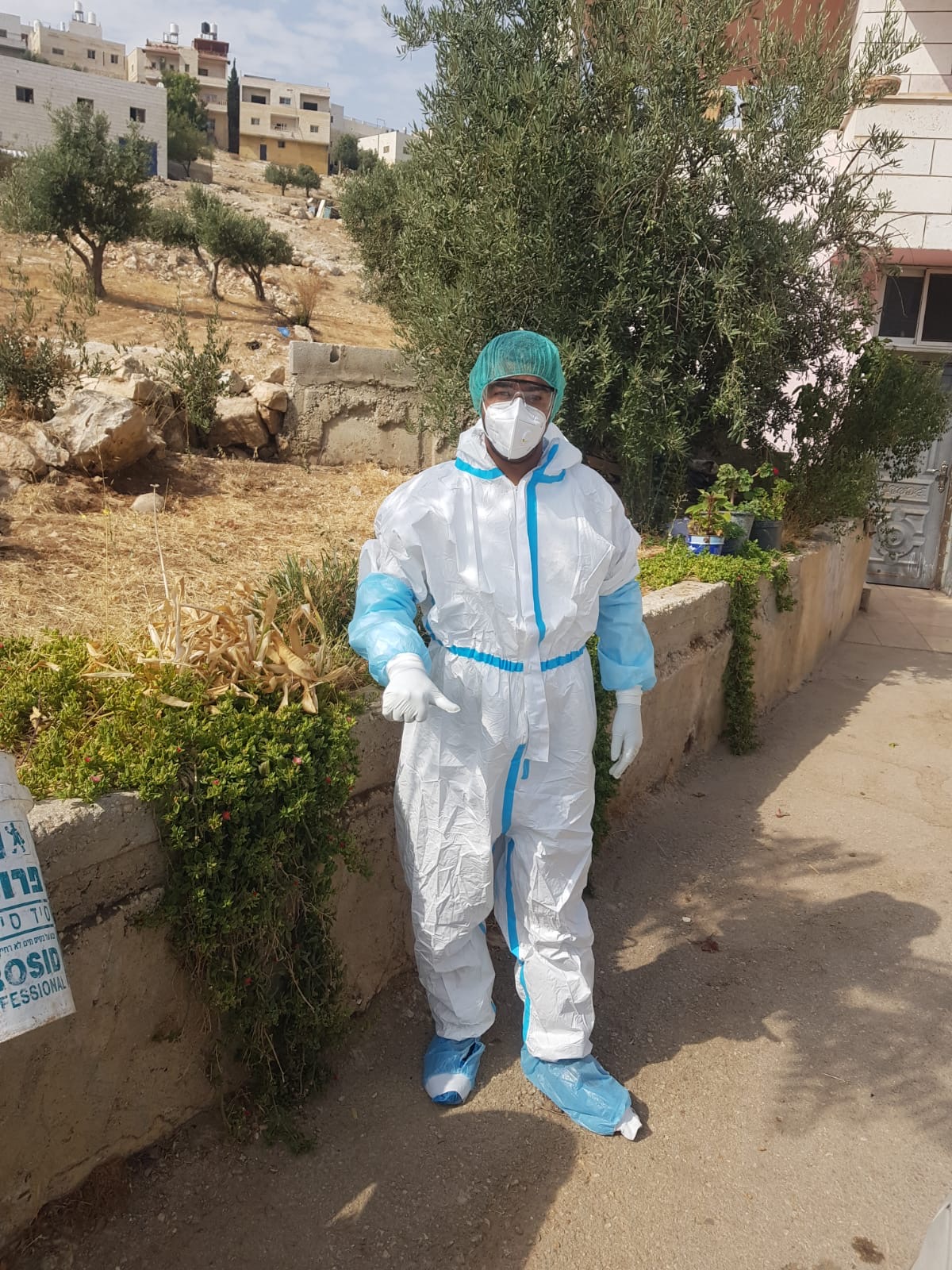 However, later in the pandemic, with increased numbers of health workers affected by COVID-19, Abed and some of his colleagues were requested by the Palestinian Ministry of Health to support preventive medicine teams. This involved support to testing persons suspected to have COVID-19, continued awareness raising and disinfection households of persons suspected or confirmed to have had COVID-19.
However, later in the pandemic, with increased numbers of health workers affected by COVID-19, Abed and some of his colleagues were requested by the Palestinian Ministry of Health to support preventive medicine teams. This involved support to testing persons suspected to have COVID-19, continued awareness raising and disinfection households of persons suspected or confirmed to have had COVID-19.
“The second wave was not so scary. We were more aware of how to deal with the virus and better prepared to protect ourselves”.
Since the outbreak in Palestine, Abed moved away from the family home where he previously lived with his parents and one sibling, for their safety. Up until recently Abed only saw his family from the house window, speaking to his mother through the window.
“In the end I am dealing with the virus on a daily basis. I do not want this virus to reach my family. My father suffers from chronic diseases and I did not want to put him at risk.”
WHO pays tribute to Real Life Heroes on World Humanitarian Day: Salsabeel
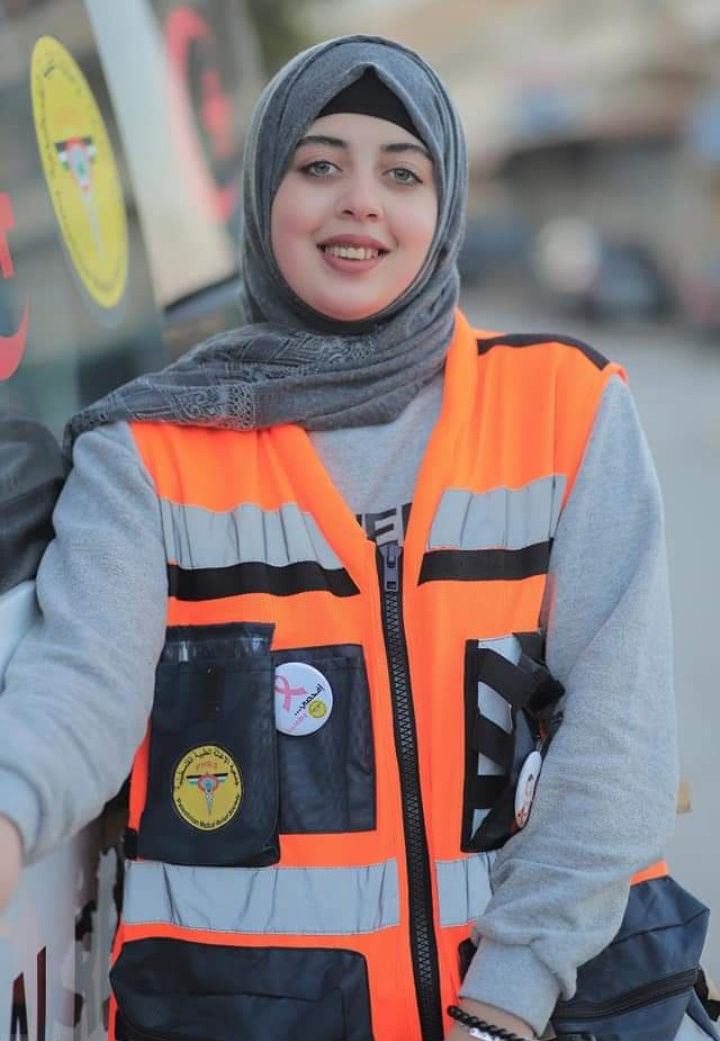 Salsabeel Salhab is a 19-year-old volunteer paramedic working with the Palestinian Medical Relief Society (PMRS) in the Bethlehem governorate. Alongside this, she works with her father in the family business. Salsabeel began volunteering when she was just 14 years old, after PMRS teams came to her school and introduced the students to their work. She joined courses in first aid and field paramedic skills. Now, Salsabeel herself introduces students and others to the works of PMRS, to raise awareness and promote community first aid skills.
Salsabeel Salhab is a 19-year-old volunteer paramedic working with the Palestinian Medical Relief Society (PMRS) in the Bethlehem governorate. Alongside this, she works with her father in the family business. Salsabeel began volunteering when she was just 14 years old, after PMRS teams came to her school and introduced the students to their work. She joined courses in first aid and field paramedic skills. Now, Salsabeel herself introduces students and others to the works of PMRS, to raise awareness and promote community first aid skills.
“Joining PMRS changed me in many ways. I became a stronger and more confident person, I speak up in discussions and I’m ready to voice my opinions openly.”
With the onset of the COVID-19 outbreak in the West Bank on 7 March, Salsabeel was assigned by PMRS ambulance coordinator in Bethlehem to undertake public awareness raising on hygiene and prevention measures. Neighbours and extended family members urged her not to go to the field and see persons with COVID-19, fearing that she would bring the disease into the community. Salsabeel was not deterred, though, and with support and encouragement from her parents and siblings, she joined the PMRS teams and has continued her work throughout the outbreak in Palestine.
“I didn’t care about intimidation by others; and I wasn’t scared going to the field. I continued my work because I knew we were doing something good for people. We received training to protect ourselves during our work, which took away a lot of the fear associated with it. I stopped interacting with friends and family for their safety. I used to go and do my work, and then after returning I would stay in my room the whole time. I quarantined myself.”
Tackling the COVID-19 outbreak has required huge efforts to promote public awareness. Salsabeel commented, “Raising awareness is helping to improve understanding, but we still have a long way ahead of us. There is still a lot of harassment towards persons who contract the disease.” She recalls the discrimination encountered by some of her neighbours who had COVID-19.
Later in the pandemic, with increased numbers of health workers affected by COVID-19, Salsabeel was requested to join the Palestinian Ministry of Health preventative medicine teams to assist in COVID-19 testing centres. Meanwhile, she continued her efforts to raise community awareness about the disease.
Salsabeel believes in the importance of her work, which she carries out to serve her community:
“The work we do may not have financial payment, but helping someone is rewarding enough, without expecting anything back.”








